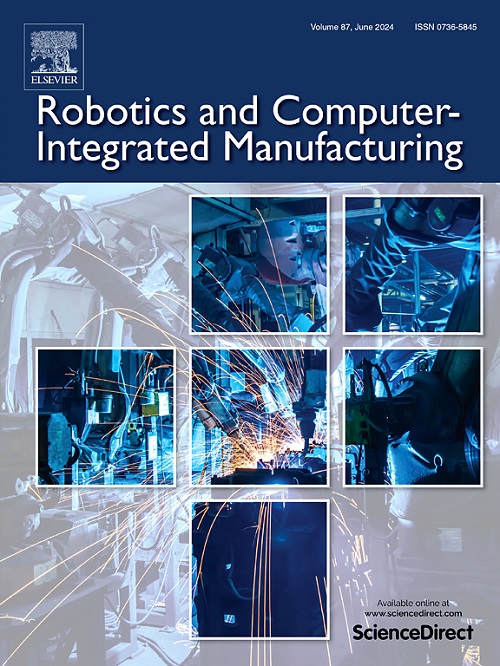基于多智能体深度强化学习的运输资源约束下离散制造车间动态调度
IF 11.4
1区 计算机科学
Q1 COMPUTER SCIENCE, INTERDISCIPLINARY APPLICATIONS
引用次数: 0
摘要
在频繁发生扰动的离散制造车间中,考虑运输资源约束的动态调度问题是一个复杂而具有挑战性的问题。此外,在不评估干扰影响的情况下重新调度可能会对车间的生产稳定性产生不利影响。为了解决这些问题,本文提出了一种基于数字孪生和深度强化学习的动态调度框架。具体而言,构建数字孪生环境为调度智能体提供高保真度的训练环境,并作为评估干扰影响的仿真手段。设计了重调度触发鉴别器机制,动态判断重调度的必要性。针对离散制造车间在运输资源约束下的动态调度问题,提出了多智能体多批评家近端策略优化算法(MAPPO-MC)。MAPPO-MC的创新之处在于,利用全局批评家从全局角度促进调度agent之间的协作,同时利用个体批评家从局部角度引导相应的agent学习各自的专业调度知识,从而实现最优调度决策。最后,大量的实验证明了该框架的有效性和MAPPO-MC的优越性。在此框架下,MAPPO-MC能够在保证生产稳定的前提下,及时有效地应对车间内的扰动。本文章由计算机程序翻译,如有差异,请以英文原文为准。
Digital twin driven dynamic scheduling of discrete manufacturing workshop with transportation resource constraint using multi-agent deep reinforcement learning
In discrete manufacturing workshop where disturbances occur frequently, the dynamic scheduling problem that considers transportation resource constraint is complex and challenging. Additionally, rescheduling without evaluating the impact of disturbances may adversely affect production stability of workshop. To address these issues, this paper proposes a dynamic scheduling framework based on digital twin and deep reinforcement learning. Specifically, the digital twin environment is constructed to provide a high-fidelity training environment for scheduling agents and serve as a simulation means for evaluating the impact of disturbances. Furthermore, a rescheduling trigger discriminator mechanism is designed to dynamically determine the necessity of rescheduling. In particular, the multi-agent proximal policy optimization with multiple critics (MAPPO-MC) is proposed to efficiently solve the discrete manufacturing workshop dynamic scheduling problem with transportation resource constraint. The innovation of MAPPO-MC lies in using the global critic to facilitate collaboration among scheduling agents from a global perspective, while employing individual critics to guide corresponding agents to learn their specialized scheduling knowledge from a local perspective, thereby achieving optimal scheduling decisions. Finally, extensive experiments have demonstrated the effectiveness of the proposed framework and the superiority of the MAPPO-MC. Under this framework, MAPPO-MC can respond promptly and effectively to disturbances in the workshop while ensuring stable production.
求助全文
通过发布文献求助,成功后即可免费获取论文全文。
去求助
来源期刊
CiteScore
24.10
自引率
13.50%
发文量
160
审稿时长
50 days
期刊介绍:
The journal, Robotics and Computer-Integrated Manufacturing, focuses on sharing research applications that contribute to the development of new or enhanced robotics, manufacturing technologies, and innovative manufacturing strategies that are relevant to industry. Papers that combine theory and experimental validation are preferred, while review papers on current robotics and manufacturing issues are also considered. However, papers on traditional machining processes, modeling and simulation, supply chain management, and resource optimization are generally not within the scope of the journal, as there are more appropriate journals for these topics. Similarly, papers that are overly theoretical or mathematical will be directed to other suitable journals. The journal welcomes original papers in areas such as industrial robotics, human-robot collaboration in manufacturing, cloud-based manufacturing, cyber-physical production systems, big data analytics in manufacturing, smart mechatronics, machine learning, adaptive and sustainable manufacturing, and other fields involving unique manufacturing technologies.

 求助内容:
求助内容: 应助结果提醒方式:
应助结果提醒方式:


